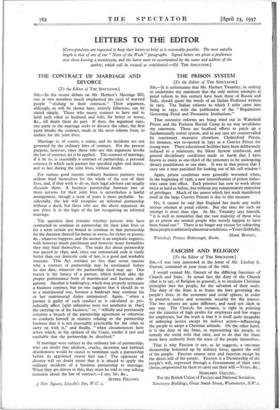THE CONTRACT OF MARRIAGE AND DIVORCE
LETTERS TO THE EDITOR
[Correspondents are requested to keep their letters as brief as is reasonably possible. The most suitable length is that of one of our " News of the Week" paragraphs. Signed letters are given a preference over those bearing a pseudonym, and the latter must be accompanied by the name and address of the author, which will be treated as confidential.—Ed. THE SPECTATOR.]' [To the Editor of THE SPECTATOR.] SIR,—In the recent debate on Mr. Herbert's Marriage Bill, one or two members much emphasised the need of married people " sticking to their contracts." Their argument, although, as will be shown later, entirely fallacious, can be stated simply. Those who marry contract to have and to hold each other as husband and wife, for better or worse, &c., till death them do part. If then, the argument runs, one party to the marriage seeks to divorce the other, the first party breaks the contract, made in the most solemn form, to endure for the joint lives.
Marriage is, of course, a status, and its incidents are not governed by the ordinary laws of contract. For the present purpose, however, since those who use this argument invoke the law of contract, let it be applied. The contract of marriage, if it be so, is essentially a contract of partnership, a personal contract in which each partner has specified rights and duties, and to last during the joint lives, without doubt.
For various good reasons ordinary business partners very seldom bind themselves for the whole of the rest of their lives, and, if they wish to do so, their legal advisers can usually dissuade them. A business partnership between two or more persons for their joint lives is nevertheless a lawful arrangement, though a term of years is more probable. In- cidentally, the law will recognise an informal partnership without a deed, but those who use the above argument do not drive it to the logic of the law recognising an informal marriage.
The question then remains whether persons who have contracted to continue in partnership for their joint lives or for a term certain are bound to continue in that partnership for the duration thereof for better or worse, for richer or poorer, &c., whatever happens, and the answer is an emphatic negative, with however much parchment and however many formalities they may bind themselves. The main Act about partnership was passed in 189o, and, since our commercial code is vastly better than our domestic code of law, is a good and workable measure. This Act contains no less than seven reasons why a contract of partnership may be terminated before its due date, whatever the partnership deed may say. One reason is the lunacy of a partner, which forbids alike the proper performance both of matrimonial and business obli- gations. Another is bankruptcy, which may properly terminate a business contract, but no one suggests that it should do so to a matrimonial one, because a bankrupt may continue his or her matrimonial duties unimpaired. Again, " when a partner is guilty of such conduct as is calculated to pre- judicially affect [split infinitives were not anathema in 189o] the carrying on of the business," or, " wilfully and persistently commits a breach of the partnership agreement or otherwise so conducts himself in matters relating to the partnership business that it is not reasonably practicable for the other to carry on with it," and finally, " when circumstances have arisen which, in the opinion of the Court, render it just and equitable that the partnership be dissolved."
If marriage were subject to the ordinary law of partnership, who can doubt that adultery, cruelty, desertion and habitual drunkenness would be causes to terminate such a partnership before its appointed course had run ? The opponent of divorce will no doubt retort that it is absurd to apply the ordinary incidents of a business partnership to marriage. When they are driven to this, they must be told to stop talking nonsense about the law of contract.—I am, Sir, &c., ALFRED FELLOWS. 5 New Square, Lincoln's Inn, IV C. 2.,










































 Previous page
Previous page